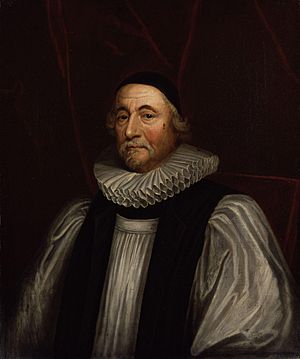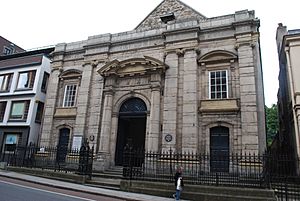William Hilton (Irish politician) facts for kids
William Hilton (who died in 1651) was an important Irish politician, lawyer, and judge. He is mostly remembered because he was related to James Ussher, a very important church leader called the Archbishop of Armagh. William Hilton married Ussher's sister, Anne, and Ussher helped him a lot in his career.
Early Life and Education
William Hilton's early life isn't very well known. He was probably born in Lifford, County Donegal, a place in Ireland where his family was important. Later, he lived in Navan, County Meath.
In 1608, William Hilton started studying law at a special school called the King's Inns in Dublin. He was first known as an attorney, which is a type of lawyer. By 1613-1614, he became a counsellor at law, which meant he could argue cases in court. He also studied law in England at Gray's Inn in 1616. He was very good at different types of law, including civil law (which deals with private disputes) and common law (which is based on past court decisions). He became a senior member of the King's Inns in 1628 and was chosen to be its Treasurer in 1640.
Becoming a Judge
By 1626, William Hilton became a judge in the Irish Prerogative Court. This court handled cases about wills and estates after people died. He likely got this job because of his brother-in-law, Archbishop Ussher, who was the head of this court. In the same year, he also became a legal advisor to the Chief Justice of Connacht, a region in Ireland, and held that job until 1637.
William Hilton also entered politics. He became a supporter of Thomas Wentworth, 1st Earl of Strafford, who was the powerful leader of Ireland at the time. Strafford was also a friend of Archbishop Ussher. Because of Strafford's support, William Hilton became a Member of Parliament (MP) for Armagh in the Irish Parliament from 1634 to 1635.
In 1638, Strafford helped William Hilton become a Baron of the Court of Exchequer (Ireland). This court dealt with money matters and taxes. Even after Strafford was removed from power in 1641, William Hilton's career continued. However, by 1642, Ireland was in a very difficult state due to unrest. William Hilton complained that he was the only judge left working in the Court of Exchequer and asked for more pay because of the extra work.
Later, in 1644, he was also appointed a judge of the Court of Common Pleas (Ireland), which handled common legal disputes. He was allowed to hold both judge jobs at the same time. He had also been a judge in special courts dealing with sea-related cases (Admiralty courts) in different parts of Ireland since 1635. In 1647, he became the main Admiralty judge for the region of Leinster. He also traveled to the North-west of Ireland to hear cases when it was safe enough to do so.
William Hilton was a very dedicated judge. He continued to hear cases in the Admiralty Court in Dublin even during the very troubled times of the 1640s. One case he judged in 1647, about saving goods from a ship (called marine salvage), showed how important his work was.
Death and Legacy
William Hilton passed away in 1651 and was buried in St Werburgh's Church, Dublin. His wife, Anne, died soon after and was buried next to him. They did not have any children.
People who study history agree that William Hilton was a skilled lawyer and a very hardworking judge. However, they believe that he became so successful mainly because of his marriage into the Ussher family and the support he received from Thomas Wentworth.
 | Jewel Prestage |
 | Ella Baker |
 | Fannie Lou Hamer |



